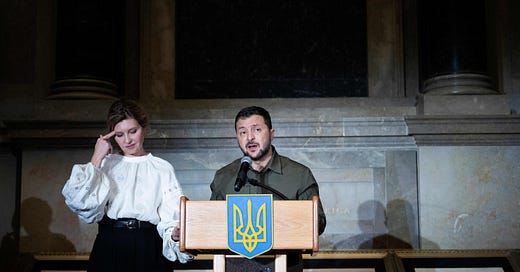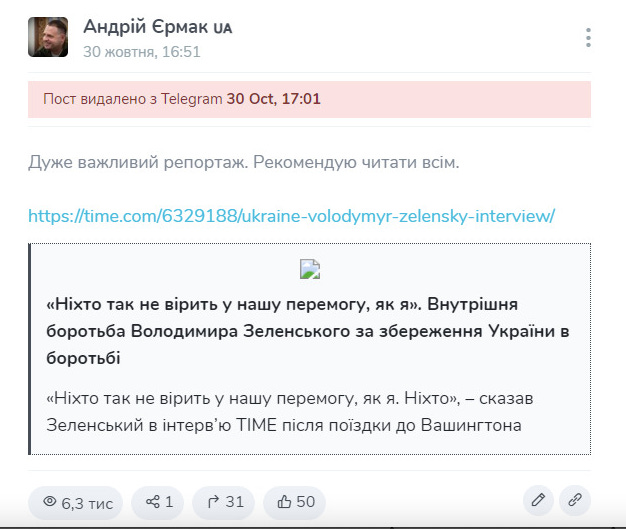Defeatism or Hope in Ukraine?
A gloomy Zelensky profile stirs controversy while a new article by the Ukrainian Armed Forces’ commander-in-chief points to a way forward.

ON TUESDAY, ANDRIY YERMAK, chief of staff to Ukrainian President Volodymyr Zelensky, recommended on Telegram that “everyone read” a “very important report” about Zelensky in Time magazine, summed up in the money quote that also became the headline: “Nobody believes in our victory like I do.” Just a few minutes later, though, Yermak took down his post. During those ten minutes, he apparently realized that the cover story by Time’s Simon Shuster was nothing to cheer for or to brag about.
The article, which opens with Zelensky’s frustrating visit to the United States in September and then follows him back to Kyiv, portrays the Ukrainian president—only recently hailed as a Churchillian figure—as angry, embittered, and exhausted, waging a supremely difficult battle not only against a ruthless foreign invader but against corruption at home. Some key excerpts:
Twenty months into the war, about a fifth of Ukraine’s territory remains under Russian occupation. Tens of thousands of soldiers and civilians have been killed, and Zelensky can feel during his travels that global interest in the war has slackened. So has the level of international support. “The scariest thing is that part of the world got used to the war in Ukraine,” he says. “Exhaustion with the war rolls along like a wave. You see it in the United States, in Europe. And we see that as soon as they start to get a little tired, it becomes like a show to them: ‘I can’t watch this rerun for the 10th time.’”
Public support for aid to Ukraine has been in decline for months in the U.S., and Zelensky’s visit did nothing to revive it. Some 41% of Americans want Congress to provide more weapons to Kyiv, down from 65% in June, when Ukraine began a major counteroffensive, according to a Reuters survey taken shortly after Zelensky’s departure. That offensive has proceeded at an excruciating pace and with enormous losses, making it ever more difficult for Zelensky to convince partners that victory is around the corner. With the outbreak of war in Israel, even keeping the world’s attention on Ukraine has become a major challenge. . . .
The usual sparkle of his optimism, his sense of humor, his tendency to liven up a meeting in the war room with a bit of banter or a bawdy joke, none of that has survived into the second year of all-out war. “Now he walks in, gets the updates, gives the orders, and walks out,” says one longtime member of his team. Another tells me that, most of all, Zelensky feels betrayed by his Western allies. They have left him without the means to win the war, only the means to survive it.
But his convictions haven’t changed. Despite the recent setbacks on the battlefield, he does not intend to give up fighting or to sue for any kind of peace. On the contrary, his belief in Ukraine’s ultimate victory over Russia has hardened into a form that worries some of his advisers. It is immovable, verging on the messianic. “He deludes himself,” one of his closest aides tells me in frustration. “We’re out of options. We’re not winning. But try telling him that.” . . .
“We’re not moving forward,” says one of Zelensky’s close aides. Some front-line commanders, he continues, have begun refusing orders to advance, even when they came directly from the office of the President. “They just want to sit in the trenches and hold the line,” he says. “But we can’t win a war that way.”
Other passages in the Time article deal with corruption in the Ukrainian government (“People are stealing like there’s no tomorrow,” Shuster quotes a “top presidential adviser” as telling him in October), manpower problems in the armed forces as a result of high casualties, and the problems in the U.S.-Ukraine partnership posed by growing opposition to aid to Ukraine in the Republican party. The conclusion is not defeatist, but not exactly inspiring either:
At the start of the Russian invasion, Zelensky’s mission was to maintain the sympathy of humankind. Now his task is more complicated. In his foreign trips and presidential phone calls, he needs to convince world leaders that helping Ukraine is in their own national interests, that it will, as Biden put it, “pay dividends.” Achieving that gets harder as global crises multiply.
But faced with the alternative of freezing the war or losing it, Zelensky sees no option but to press on through the winter and beyond. “I don’t think Ukraine can allow itself to get tired of war,” he says. “Even if someone gets tired on the inside, a lot of us don’t admit it.” The President least of all.
While the piece could be seen as a rebuke to the West—and especially to the Trumpist-dominated Republicans party—rather than to Zelensky himself, the portrayal of the Ukrainian president as a self-deluded man on a lonely crusade to win an apparently unwinnable war predictably infuriated most Ukraine supporters; all the more so, perhaps, since many read the headline as suggesting that no one except Zelensky believed in Ukraine’s victory anymore. On social media, many accused Shuster of peddling “Russian propaganda,” pointed to past Shuster articles whose headlines allegedly proved he has an anti-Ukraine bias, or even blamed his Russian background. (The Moscow-born Shuster emigrated to the United States with his family as a child in 1989.) And yet Shuster’s coverage of the war in August 2022 year was sufficiently pro-Ukraine that Zelensky awarded him an “Order of Merit.” Several months later, he wrote the glowing profile of Zelensky as Time’s Person of the Year. (This history probably explains Yermak’s Telegram gaffe.)
Shuster’s new article is hardly above criticism. It may be overly wedded to the “embattled Zelensky” narrative, giving short shrift, among other things, to Ukraine’s recent successes on the frontlines or the latest weapons deliveries. In a Radio Liberty interview, Zelensky adviser Mykhailo Podolyak called it “the subjective viewpoint of a specific journalist who has his own perspective” and criticized the reliance on anonymous sources—officials and officers who, he suggested, may be inflating their own importance. He also disputed, for what it’s worth, the claim that Zelensky is “angry” or feels betrayed by Western allies.
On the other hand, the Ukrainian website New Voice quoted a number of Ukrainian public figures and opinionmakers who thought that, whether or not all of its specific claims were accurate, the “scandalous” article identified very real and important issues and could be a useful “cold shower” for Ukrainian leadership and citizenry. The problem, some of those analysts said, is that it would also be read by Ukraine’s enemies. True enough: Coverage in official Russian media was gleeful. And in the West, those who oppose support for Ukraine are likely to cite the Time story to bolster the view that Ukraine can’t win the war, that further assistance is just throwing good money after bad, and that Kyiv’s Western allies should lean harder on Zelensky to accept a peace deal under which Russia would get to keep all or most occupied Ukrainian territories.
FOR A SOBER AND CLEAR-EYED but much less fatalistic view, one can turn to another magazine feature getting a lot of attention right now: The Economist’s report on Valery Zaluzhny, the commander-in-chief of the Armed Forces of Ukraine, and Zaluzhny’s own companion article on what Ukraine needs to win. Zaluzhny frankly acknowledges the problem:
The war is now moving to a new stage: what we in the military call “positional” warfare of static and attritional fighting, as in the first world war, in contrast to the “manoeuvre” warfare of movement and speed. This will benefit Russia, allowing it to rebuild its military power, eventually threatening Ukraine’s armed forces and the state itself.
Zaluzhny warns against underestimating Russia, given its superiority in sheer quantity of military hardware as well as manpower; he also points out that in many cases the Russian military has adjusted to Ukraine’s increased capabilities, for instance with improved electronic warfare, counterbattery fire, and reconnaissance drones. But instead of succumbing to doom and gloom or advocating an untrustworthy peace, he outlines a clear plan for Ukraine’s own response. Above all, it has to do with better technology—not only supplied by the West, but built by Ukraine itself. Western cooperation, however, remains essential:
We have already built many of our own electronic protection systems, which can prevent [signal] jamming. But we also need more access to electronic intelligence from our allies, including data from assets that collect signals intelligence, and expanded production lines for our anti-drone EW systems within Ukraine and abroad. We need to get better at conducting electronic warfare from our drones, across a wider range of the radio spectrum, while avoiding accidental suppression of our own drones. . . . .
For now, we have managed to achieve parity with Russia through a smaller quantity of more accurate firepower. But this may not last. We need to build up our local GPS fields—using ground-based antennas rather than just satellites—to make our precision-guided shells more accurate in the face of Russian jamming. We need to make greater use of kamikaze drones to strike Russian artillery. And we need our partners to send us better artillery-reconnaissance equipment that can locate Russian guns.
Zaluzhny identifies better, more efficient training for Ukrainian reservists as another key task, noting that “Russia has failed to capitalise on its hefty manpower advantage because Vladimir Putin is worried that a general mobilisation might spark a political crisis, and because Russia cannot train and equip enough people”—but acknowledging that Ukraine, too, needs to do better in this area. And, finally:
We also need to focus on modern command and control—so we can visualise the battlefield more effectively than Russia and make decisions more quickly—and on rationalising our logistics while disrupting Russia’s with longer-range missiles. New, innovative approaches can turn this war of position back into one of manoeuvre.
Zaluzhny speaks of helping Ukraine get out of the “trap” of a positional war of attrition. His interview and article are also a good way to get out of the trap of doom and gloom.





